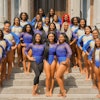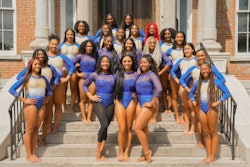NEW YORK — Charles Barkley plans to lobby for better graduation rates in his new job as a college basketball commentator.
CBS and Turner Sports’ new 14-year, $10.8 billion deal to televise the NCAA tournament adds announcers from the NBA broadcasts on TNT to March Madness. And Barkley is mad about how few Division I players, especially Black men, earn degrees.
“They got $10.8 billion. That’s a lot of freakin’ money,” Barkley told The Associated Press. “The players aren’t getting any of it, so clearly somebody is making money. I’m not opposed to people making money, but we do have an obligation, to, like, ‘OK, you know what? We’re making a (ton) of money. Let’s at least make sure these kids get educated.’”
When Turner Sports chief David Levy asked him about joining the college studio show, Barkley said he wouldn’t take part if he couldn’t get academic. He met with NCAA President Mark Emmert in Atlanta in January, which convinced him players shouldn’t be paid because it wasn’t fair to give athletes in some sports money but not others.
“He understands what this is all about,” says NCAA Vice President Greg Shaheen. “His comments are representative of the many issues in the environment of basketball we’re all trying to address. … It’s a great opportunity for him to comment on those topics.”
Barkley does believe, unlike the NCAA, that college players should be able to get loans from agents. He was surprised to learn that Black athletes have higher graduation rates than Black students as a whole, which left him even more dismayed.
According to the latest NCAA statistics, the graduation rate for Black Division I men’s basketball players was 58 percent. Barkley would like to see it be 70 percent — saying he figures there are three “boneheads” for every 10 college athletes.
“We can’t expect these kids to go out and be good fathers and take care of their families if they’re uneducated,” Barkley said. “There is personal responsibility. But you’ve got to help these kids because, first of all, all these kids think they’re going to play on the next level.”
He’s thought about writing a book tracking down all the guys he played with in high school, college and the pros. When Barkley reached the NBA, he realized just how few of his contemporaries made it. He heard stories that some were homeless.
Barkley thinks it’d be a fascinating book, but worries it may seem as though he’s taking advantage of them. For now, he can send the message of why earning a degree is so vital.
“I’ve been on the sidelines, but now I’m actually in the fight,” Barkley said. “I see how it works now. You can’t make a difference unless you talk about it. Now I’m going to keep banging the drums.”
TNT colleague Kenny Smith, who will join Barkley on the NCAA broadcasts, says he holds college coaches to an even higher standard than their NBA brethren because they’re responsible for players’ education and discipline. Barkley is thrilled when he sees a coach suspend a player, because he’s seen how a sense of entitlement is as dangerous to athletes as the lack of a diploma.
Barkley is still figuring out how and when to best get his message out on the air. He doesn’t want to be a “downer” and intends to embrace the happier aspects of his new job.
“I’ve got to wait for the appropriate time,” he said. “I can’t start out March Madness on Thursday saying, ‘These graduation rates suck.’ That wouldn’t be appropriate.”
When asked whether it would be appropriate to call out individual schools for low graduation rates, he responded, “I don’t ever want to embarrass anybody, but some of these people deserve to be embarrassed. That’s a good question. I don’t know the answer to it yet.”



















